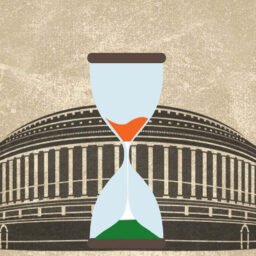
Nuthalapati Venkata Ramana popularly known as N.V Ramana is the 2nd most senior judge in the Supreme Court of India after Justice S.A Bobde. Recently he is appointed as the 48th Chief Justice of India by the President of India (by clause (2) of Article 124 of the constitution of India) with effect from 24th April on the recommendation of Justice S.A. Bobde (Current CJI). Justice Ramana would hold the office of CJI until he retires which is scheduled for 26th August 2022. Hence, he would hold the office for a period of approximately 16 months. With this Justice, NV Ramana would become the 2nd person from Andhra Pradesh to become the Chief Justice of India.
EARLY LIFE
He was born on 27th August 1957 in the Ponnavaram Village in Krishna District of Andhra Pradesh. He belonged to a Telugu Speaking humble family of agriculturists. In 1975 during the Emergency Period, Justice Ramana fought for civil and human rights as a student leader in which he sacrificed a year of college for which he didn’t have regret to date. Before Justice Ramana entered into the legal field and joined a law college, he worked as a journalist in a regional newspaper for two years. Finally, in 1980, he joined law college.
CAREER IN LAW
Justice Ramana was enrolled as an advocate at the Bar on Feb 10, 1983. He used to practice in the High Court of Andhra Pradesh, Central, and Andhra Pradesh Administrative Tribunals, and the Supreme Court of India in Civil, Criminal, Constitutional, Labor, Service, and Election matters. . He served as a Panel Counsel for various Government Organizations including the Indian Railways. He has worked as Additional Standing Counsel for Central Government and Standing Counsel for Railways in the Central Administrative Tribunal at Hyderabad
Constitutional law, Criminal Law, labor law, services, Inter-state River Disputes, and elections are his specialization
It was in the year 2000 that he became a permanent judge of Andhra Pradesh High Court. He as well served as the Chief Justice of Andhra Pradesh High Court from March 10, 2013, to May 20, 2013. After then he was appointed as the Chief Justice of Delhi High Court w.e.f. Sept 2, 2013. On 17 Feb 2014, he became a judge of the Supreme Court of India and now is appointed as the next Chief Justice of India. Although Justice Ramana was from a humble
KEY INITIATIVES
While he was the President of the Andhra Pradesh Judicial Academy, Justice Ramana initiated various measures to promote the Indian Legal System. He organized the first-ever joint conference in the history of India for the Judicial Officers of all ranks, Police Officers, Correctional Services Authorities, Juvenile Justice Boards, Advocates, Prosecutors, Women bodies, Social groups, and Media representatives to have a dialogue on the growing menace of sexual assault on women. His recommendations were taken into consideration by the Justice Verma Committee. He has been firm on the idea to fill the vacancies of Public Prosecutor as evident by his direction as Judge of High Court which resulted in speeding up of criminal trials.
He as well as advocated the idea of using regional language as the language of court for having increased and meaningful participation of rural litigants. Along with this, Justice Ramana has authored various papers and attended numerous National and International Conferences and seminars. “First Conference of Public Prosecutor” in the state of AP was the brainchild of Justice Ramana. He as well has been invited by the UK to examine the Justice Delivery system and the USA to assimilate their legal System.
Justice Ramana is an enthusiastic ally of legal changes, especially the Alternate Dispute Redressal instrument, and advances the utilization of innovation in the Indian Judicial System. He pushes for the execution of the Justice conveyance framework in local dialects and promoters for embracing reasonable measures for conveying quick Justice to the majority especially the more fragile and oppressed segments of the general public. He has an unmistakable fascination for Philosophy and Literature other than Law.
LANDMARK DECISIONS
Nabam Rebia, and Bamang Felix v. Deputy Speaker, 2016
The supreme court bench comprising of Justice NV Ramana Quashed the order of the Arunachal Pradesh Governor
Jindal Stainless Ltd v. State of Haryana, 2017
Justice Ramana was the part of the nine-judge bench that upheld the validity of the imposition of entry tax by the states on goods that are imposed from other states.
Central Public Information Officer v. Subhash Chandra Agarwal, 2019
A five-judge SC bench including Justice Ramana held that the office of the CJI comes under the purview of the Right to Information.
Foundations for Media Professionals v. Union Territory of Jammu and Kashmir, 2020
A three-member committee was constituted by a three-judge bench which has Justice Ramana investigate the allowing of 4G mobile network in J&K
Anuradha Bhasin v. Union of India, 2020:
A three-judge bench had asked the J&K administration to review all orders restricting telecom/internet services.
CONTROVERSY UPON THE ALLEGED LETTER BY CM OF ANDHRA PRADESH
Y.S Jagan Mohan Reddy, CM of Andhra Pradesh, wrote to the chief justice of India in October 2020. In this letter, he accused Justice Ramana and his relatives to have engaged in corruption for the acquisition of land in Amravati. He as well accused him of destabilizing his Government by influencing the hearing and decisions of the Andhra Pradesh High Court. By addressing his letter to the CJI, Jagan Mohan Reddy requested to initiate an investigation into the alleged matter and further take necessary actions. His letter was highly condemned by the lawyer’s body and judges. The All-India Lawyer’s Union supported the inquiry however called for strict penalties against the Reddy if the allegation is found to be false.
However, the Supreme Court after having executed an ‘in-house’ procedure concerning the complaint sent by the Chief Minister of Andhra Pradesh, declared that the complaint stands dismissed. No reason as such was provided and everything stood confidential as the procedure for investigation was in-house. Along with this, there are several cases filed against the Y.S Jagan Mohan Reddy for contempt of court and alleging false accusations against a sitting supreme court judge. However, these petitions are still pending in the Supreme Court and yet to be heard.
Author(s) Name: Mukund Agarwal (Symbiosis Law School, Pune)
















